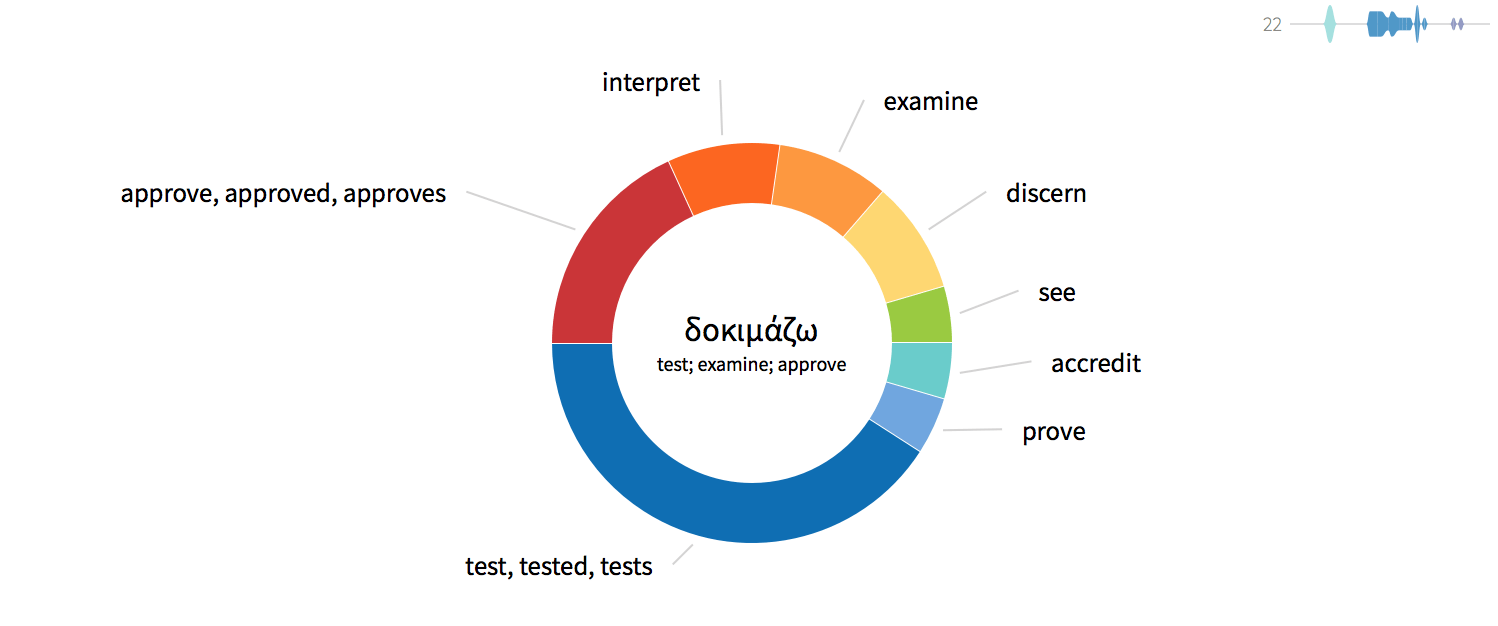In a previous tip on Bible concordances, I showed you how to do a simple word study. I also promised to teach you how to do more advanced word studies. Well, today is that day. This week’s Bible study tip is all about the in’s & out’s of word studies.
We have a lot to talk about, so let’s jump right in!
Why Do a Word Study?
If we already have the Bible in a language we can understand and study, what’s the point of word studies? Here are a couple reasons.
First, the meaning of words change with time. Most of us only understand a word’s meaning in its current context. But, what did that word mean 100 years ago? For example, we can no longer assume the word “bad” means something of poor quality; nowadays it can mean “good” depending on its context. Consider the King James Version of the Bible. An English word you’re reading in the KJV might mean something completely different to the original translators than it does in modern English (visit KJVquiz.com to see what I mean). Thus, when it comes to Bible study, we must make it our goal to understand what the word meant to the biblical author and how they used it.
Secondly, translating the Bible is a difficult job and there’s not always a clear translatable equivalent. An example of this is the German word blitzkrieg, which has no real English equivalent. Instead, we use the German word without finding a comparable English word. This is one reason why we have so many modern translations of the Bible. Our language remains in flux, so translators work to find the best way to communicate what the biblical authors wrote in modern language. So, if you want to best understand what a word means you should turn to the original languages and do a word study.
The ultimate goal behind Bible word studies is to get a grasp on biblical concepts that you would not simply get by reading the Bible alone. Share on XThe ultimate goal behind Bible word studies is to get a grasp on biblical concepts that you would not simply get by reading the Bible alone. Digging into the words behind your English Bible can provide the knowledge needed to build better biblical understanding.
Word Study Prerequisites
When it comes to the process of doing a word study, there are two routes you can take: basic & advanced. The first is a basic word study, which is perfect for those who are first entering the realm of word studies. The three step process outlined below will give you everything you need to do a word study. And like most things in life, learning to do a basic word study gives you the building blocks necessary for doing advanced word studies.
If you’re going to get the most out of your word studies, there is one important tool you need: patience. As you’ll see in the steps below, word studies are not difficult. Most of the work involves looking up lots of Bible verses and doing lots of reading. This means word studies are time consuming. But, if you are patient, your time spent doing word studies will always be fruitful and increase your biblical understanding.
Throughout this study I will highlight various tools & how you can use them to conduct a word study. This tip is quite lengthy, so if you’re only interested in basic word studies, feel free to read that section & skip the advanced steps. So, without further ado, let’s get started with a basic word study.
When doing word studies, the most important skill you need is patience. Share on XBasic Word Study
Step 1: Find a Word to Study
The first step in a word study is finding the right word to study. The right word is dictated by your study. As you read through a passage of Scripture, a word or two will catch your eye & pique your curiosity. When that happens, you’ve found a word worth studying.
In 2010 I was preaching through 1 Thessalonians. As I studied the second chapter, a phrase in verse 4 caught my attention & made me pause: “we have been approved by God.” The word “approved” seemed awkward, so I investigated further. We will use my study of this word to illustrate each step in the process.
Once we’ve found a word to study in our English Bible, we need to find the underlying Greek or Hebrew word so we can dig deeper. In the Olive Tree Bible app this means switching from the standard ESV Bible to the Strong’s tagged ESV. With the Strong’s Bible open, we can tap on the word “approved” in verse 4. The popup shows that we are dealing with the Greek word δοκιμάζω (dokimazō), which is Strong’s number G1381.
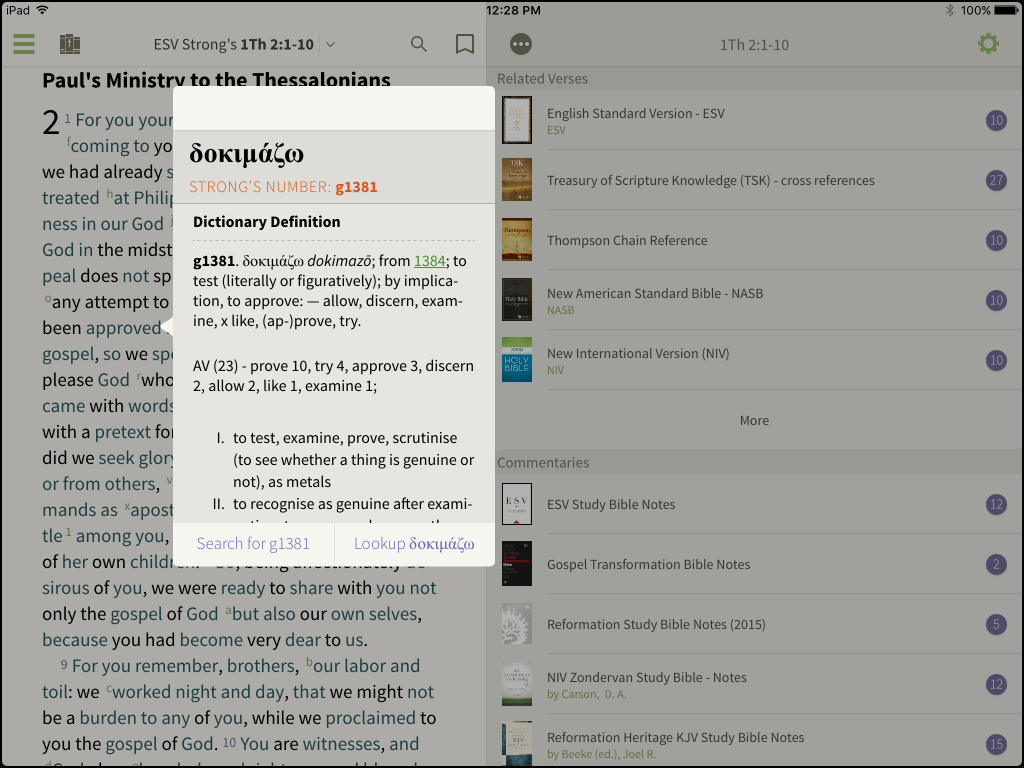
We now have all the pieces we need to begin our word study.
Step 2: Consult a Strong’s Dictionary or Lexicon
Our next step is to look up the Greek word in a dictionary or lexicon. We’ll use the Strong’s number (or GK number if you’re using the NIV) to help us find the word. Thankfully, Olive Tree makes this step easy because everything we need is in the popup (see the screenshot above).
This step provides us with some preliminary information about the word in question. Here we find it’s meaning, some basic glosses (English translations), as well as the number of times the word appears in the Bible. While not elaborate, this information primes the pump before moving to the next step.
In this case, Olive Tree’s Strong’s dictionary shows us that dokimazō means “to test, examine, prove, scrutinize” or “to recognize as genuine after examination, to approve, deem worthy.” We will keep this information in mind as we move to our next step.
Step 3: Find All Occurrences
The final step is to find all occurrences of our word in the Bible. This step will give us a broader understanding of how dokimazō is translated in our English Bible. This step is easy in the Olive Tree app. With the popup still open, all we have to do is tap the “Search for g1381” button, and it’ll search the ESV Strong’s Bible for every occurrence of dokimazō based on its Strong’s number. Our search shows there are 22 occurrences in 20 verses.
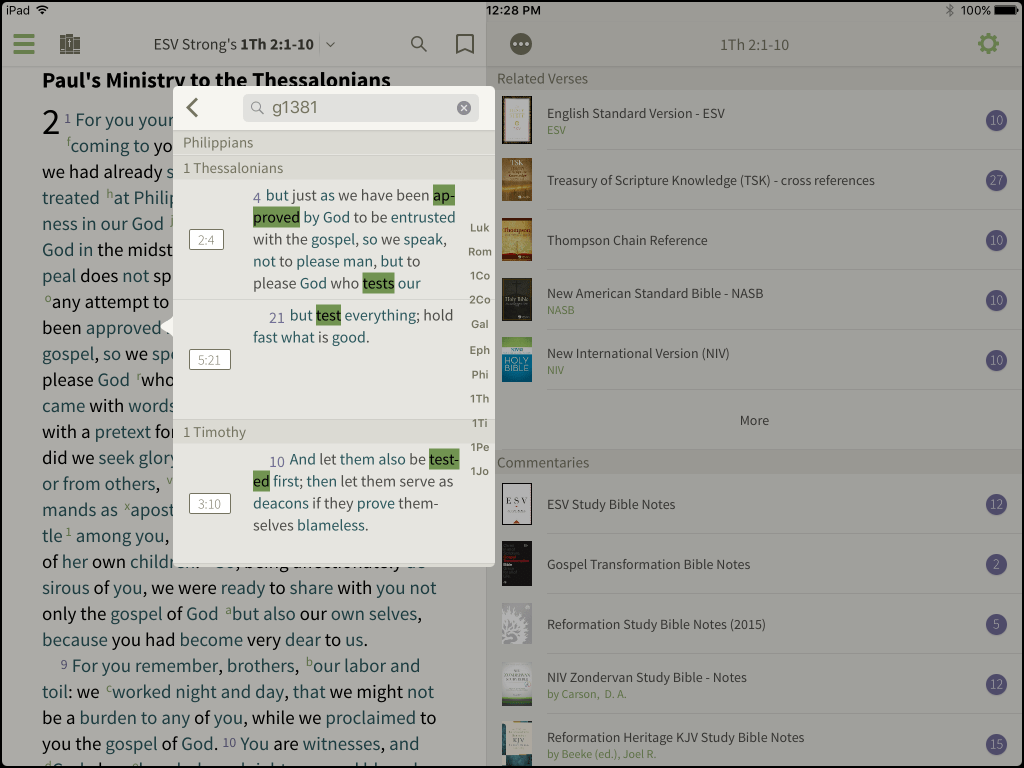
Alternatively, you could do this with a Bible concordance by looking up the Strong’s number and finding all its results.
With all occurrences found, now our task is to read every single verse where dokimazō is found. After reading through each verse, we find that dokimazō has to do with the idea of examining or testing something, which aligns with our definition in step 2. This word is mostly found in Paul’s writings and refers to examining one’s self. In the case of 1 Thessalonians 2:4, note how God is the one approving or examining Paul and his co-laborers for the work of ministry. Additionally, the Strong’s lookup shows that dokimazō is used twice in this verse. This isn’t obvious in the ESV because the second time it is translated as “tests.”
Just a simple search of the word in our Bible has uncovered a wealth of information and gives us a better understanding of how the Bible’s authors used the word, as well as how it fits with our phrase in question. At this point, we have successfully completed our word study. We have uncovered the lexical range of dokimazō in the New Testament and now have a general knowledge of the Bible’s teaching on testing or approving something.
That’s all there is to a simple word study. If that’s enough for you, you can skip ahead. But, if you want to learn how to dig even deeper, let’s talk about advanced word studies.
Three steps to a word study: 1) find a word, 2) look it up in a dictionary, & 3) read all the occurrences. Share on XAdvanced Word Study
A basic word study only scratches the surface of what you can uncover. There is so much more we can unearth that will expand our understanding of any biblical concept. If we’re willing to put in more work, we can see it our apprehension grow exponentially.
Note: to do an advanced word study, you’ll need to start expanding your Bible study library beyond basic Bible study tools. The tools used from here on out are specialized and are best used in Bible software.
So, if you’re ready to dig even deeper, let’s get started with the steps for an advanced word study!
Step 0: Do a Basic Word Study
Until we’ve exhausted our basic word study, we needn’t go any deeper. We’re not ready to move forward until we’ve looked up every single verse and made notes on how the word is used. It’s only after these steps are done that we’re ready to move on.
Step 1: Find Other Words Translated as Your Word
Our first step requires finding all the other Greek (and Hebrew) words translated as our English word. With our concordance this is a straightforward task. We will look up the English word and note all the Strong’s numbers used for it. Then we’ll do a basic word study for each new word.
I’ll be honest here. Depending on how many words I need to look up, I will only read a sampling of the verses. Our goal is to study these words as an extension, not to do a full word study on these derivative words. But, if you have the time, I would certainly encourage reading every verse.
In the case of our example, we would look up the word “approved” in our concordance. The ESV returns 14 verses using some form of the word “approve,” from seven (7) different Greek word, including dokimazō. So, in this instance, we would have six (6) additional words to lookup. Examining these Greek words also reveals there are several words that appear similar to dokimazō, as they include the doki- prefix. This takes us to our next step.
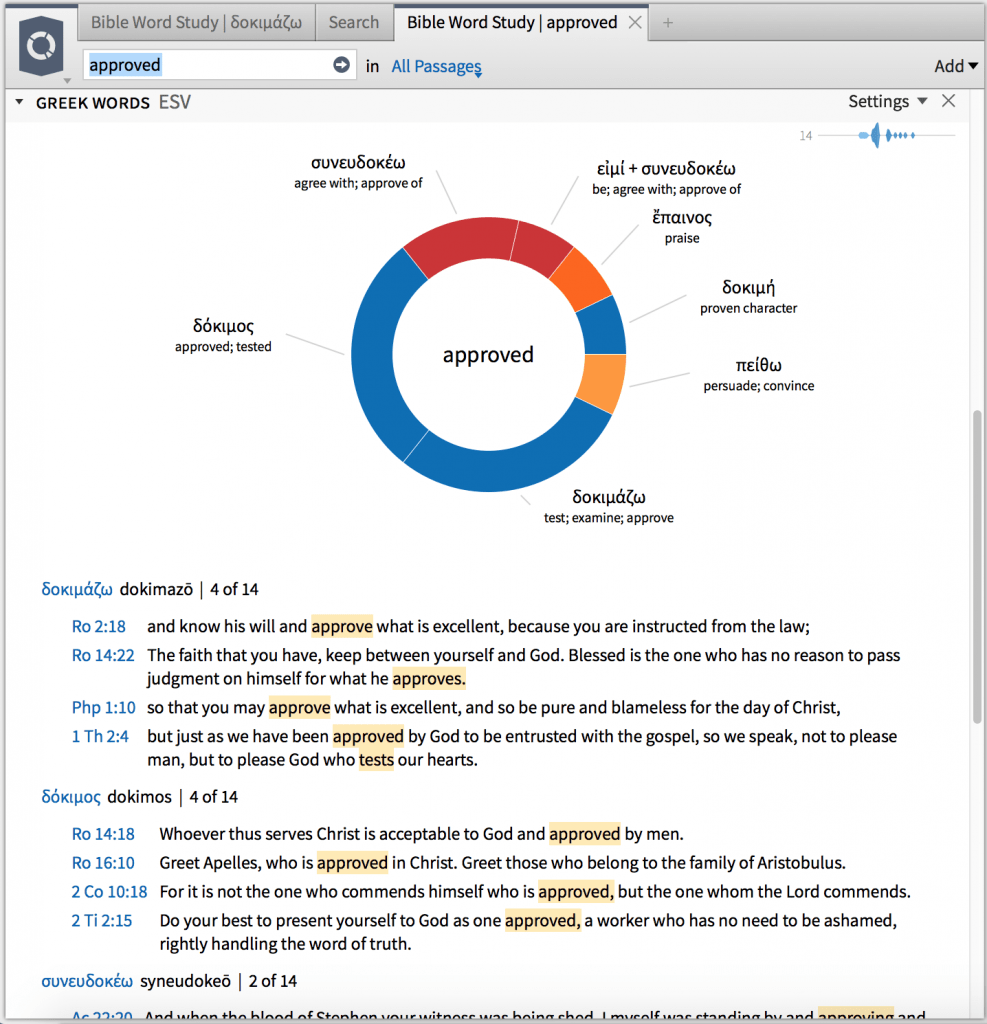
Step 2: Find Related Words
Language is built using root words that expand with the use of prefixes & suffixes. Often, these words share similarity in meaning, or at least can be seen how they derive from their root. For example, take the word “act,” which means to do something. From this root word we can make other words such as: activity, react, action, interaction, and so on. All these words imply doing some kind of action. The biblical languages work similarly.
With that in mind, the next step in our process is to find all words related to our Greek or Hebrew word.
We can accomplish our task a couple ways. The first method utilizes a more advanced Greek or Hebrew dictionary, such as the Theological Dictionary of the New Testament (TDNT), New International Dictionary of New Testament Theology & Exegesis (NIDNTTE), or Theological Lexicon of the New Testament (TLNT). Such dictionaries look at the Greek or Hebrew words in depth, examining their usage & theological implications throughout the Bible. One advantage of these dictionaries is how they group words together based on their root. Therefore, when you look up your starting word, you will find all its cognate forms.
Our second option is to use the power of Bible software, which I heartily recommend at this point in your study. One of the advantages of Bible software is everything is only a couple of taps or mouse clicks away. For example, Logos Bible Software has a feature in their software called the Bible Word Study Guide. This tool allows you to do a word study in a breeze by generating a full report on your word of study, whether it be English, Greek, or Hebrew. One of the reports generated by this guide is a “root” report. This report shows you the root word of the word you’re studying, as well as all other words derived from that root. So, instead of flipping through pages upon pages, the work is done for you (along with several other steps we’ll get to below).
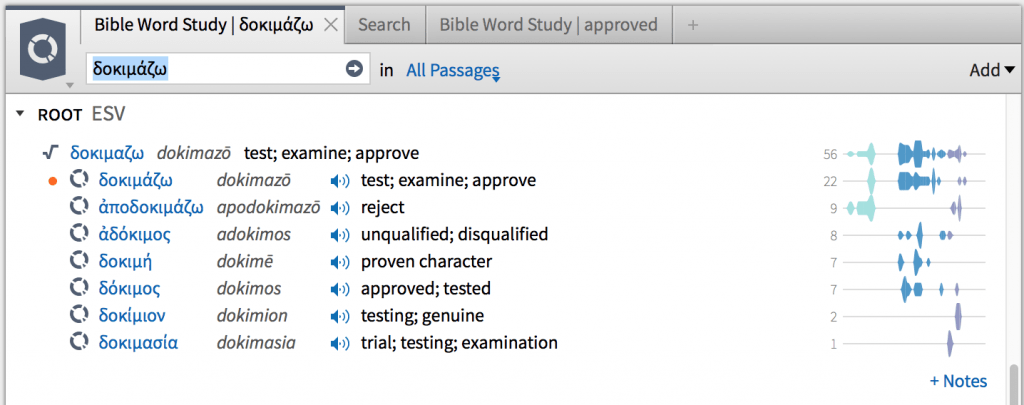
When it comes to our Greek word dokimazō, it is in fact the root word. All the cognate words derived from dokimazō include:
- apodokimazō (reject)
- adokimos (unqualified or disqualified)
- dokimē (proven character)
- dokimos (approved or tested)
- dokimion (testing or genuine)
- dokimasia (trial, testing, or examination)
With this information in hand, we then repeat the steps of our basic word study with these words. And, of course, if you’re using a dictionary like the TDNT, make sure you take time to read the entries. This is an important step because they provide a wealth of insight that you would otherwise miss.
Are you getting the hang of it yet? You study a word, find more words, and repeat the process.
Step 3: Find Synonyms
The third step in the process requires us to find all the synonyms. Often times, we complete this step by working through the first two steps; but, sometimes there are some related words that can slip through the cracks. A book of Greek or Hebrew synonyms is the perfect tool to help you find these. My favorites are Trench’s Synonyms of the New Testament & Girdlestone’s Synonyms of the Old Testament. These resources provide a list of synonyms, as well as some theological insight on the words’ usage & similarities.
In this case, we did miss a word. Peirazō is a synonym for dokimazō, and it is yet another word we need to study.
The important thing about synonyms is we might want to study their cognate words as well, since they will likely have similar usage. This will not only round out our understanding, but give us a broader view of the concept we’re studying.
Step 4: Bridge the Testaments
Up to this point we’ve spent the majority of our time looking at either the Greek or the Hebrew. That only gives us a view of one side of the Bible. If we’re looking at a Greek word we’ve only spent time in the New Testament. What about the Old Testament?! That’s where the next step in the process comes in.
When we did our concordance work, we should have made note of any Old Testament references, as well as any related Strong’s numbers. This can serve as the foundation of our study in the other side of the Bible. Starting with those words, we’ll do more basic word studies.
Another method starts with our Greek or Hebrew word by way of the Septuagint. The Septuagint is a Greek translation of the Hebrew Bible, and it’s a translation that was familiar to the likes of Jesus and Paul. The advantage the Septuagint brings is we can lookup our Greek word among its pages, and then see the corresponding Hebrew words, and vice versa.
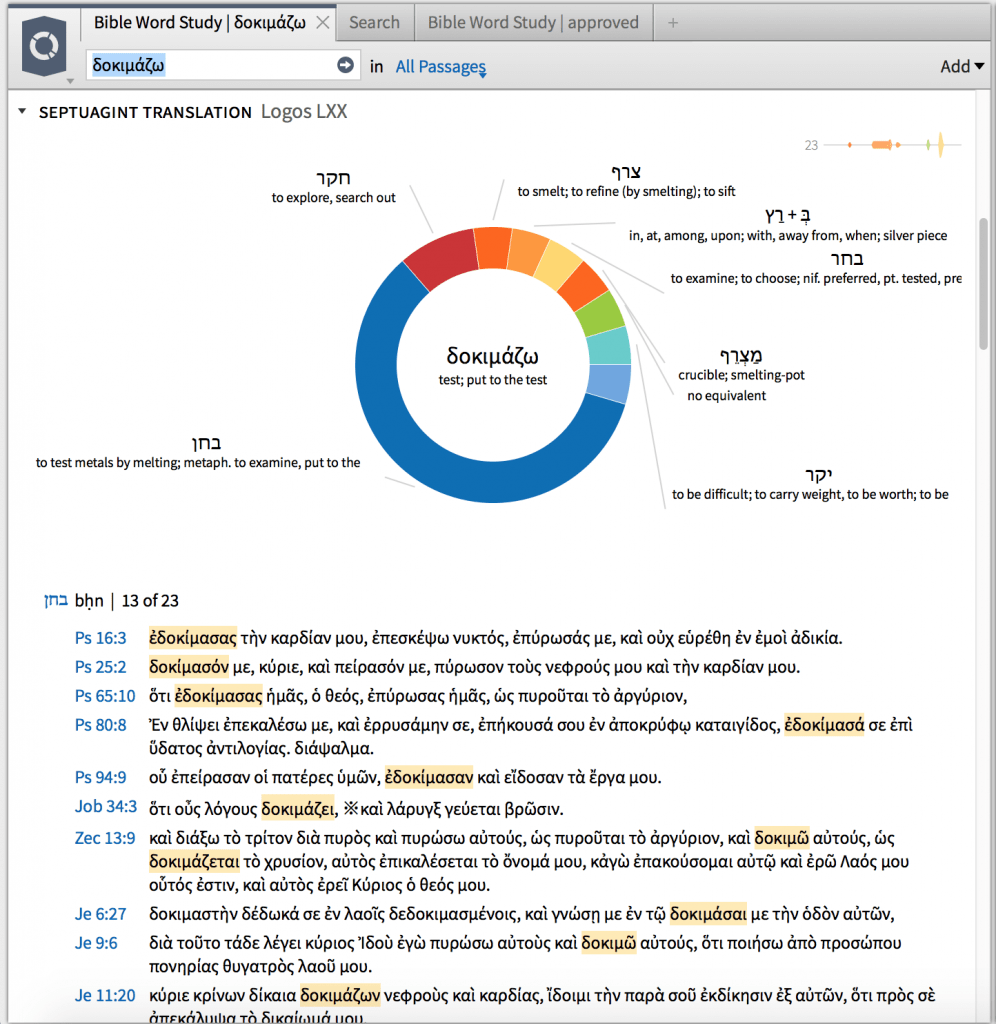
To be honest, searching the Septuagint is a task best left to Bible software because a concordance won’t help us. This is an especially easy task with Logos’ Bible Word Study Guide. With the necessary resources in our library, one of the reports generated is a “Septuagint Translation” report. This report lists all the Hebrew equivalents for any Greek word we’re studying, so long as it appears in the Septuagint. We can then take this information and lookup all the words and verses, again, using the steps above.
At this point, we’ve essentially exhausted everything we can glean from the Bible. Does that mean we’re finished? Nope! There’s one last step!
Step 5: Look Outside the Bible
If we’re studying a Greek word, there’s one more step we can take after exhausting the Bible. We can expand our search to extra biblical literature, using Bible software. There are several Greek writings in antiquity, many of which have relevance to the Bible or were written around the same time. Some of these writings include: the Early Church Fathers, Josephus, and Philo.
With a tool like Logos, these searches are generated for us as part of the Bible Word Study Guide. As we search these resources in their original languages, we can then read their corresponding English translations. When we do this, we get a wider sense of how the word was used outside the Bible.
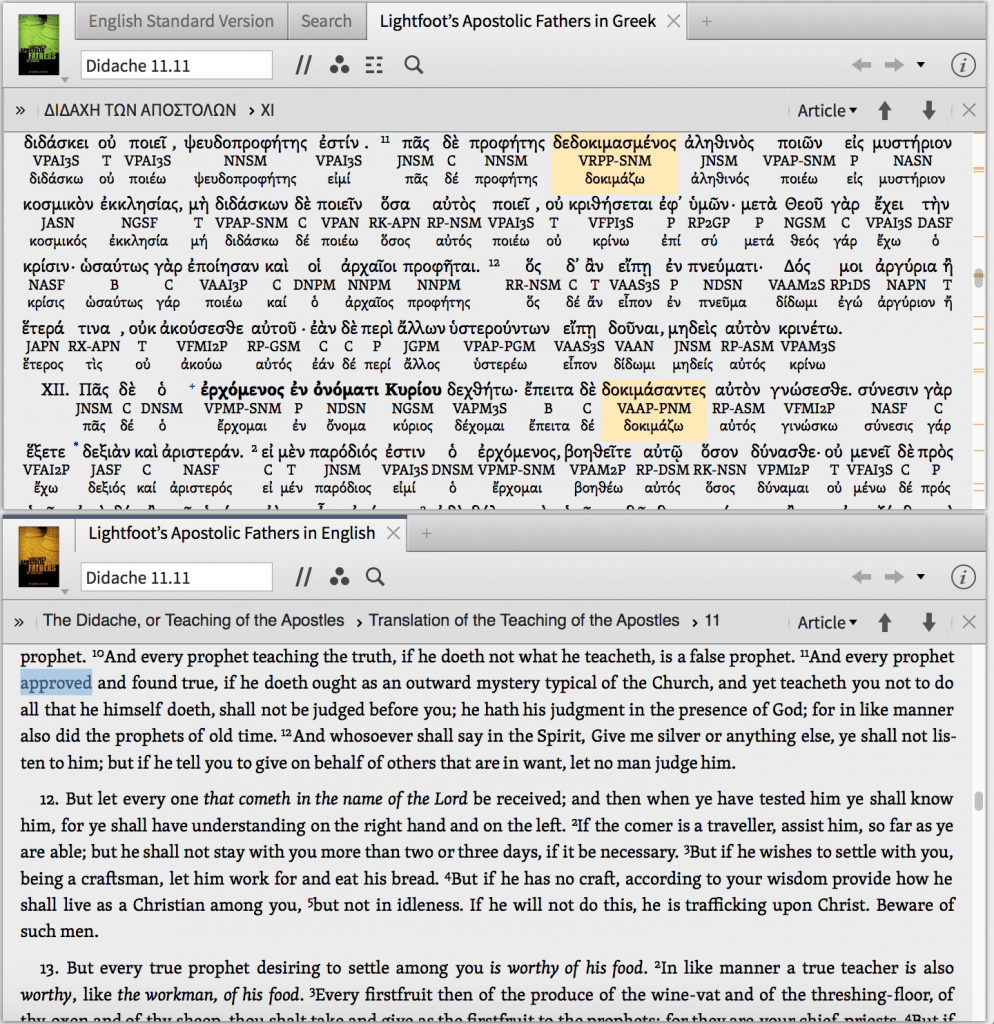
I find this step to be helpful with words that only have a few biblical occurrences. When a word occurs less than a handful of times, it’s difficult to get a strong sense of its usage. Thus, this step can help broaden the horizon.
In terms of our study of dokimazō, it appears 20 times in the Apostolic Fathers and 38 times in Philo. Reading those instances would further round out our study.
Study Summary
After extensive reading, our understanding of dokimazō should be on par with what the dictionaries say. As it relates to our verse (1 Thessalonians 2:4), not only does God test people, like on the day of judgment (1 Cor. 3:13), but he is currently testing our hearts—specifically as it relates to our usefulness for ministry.
Advanced word studies require more work, but are just as simple as basic word studies. Share on XWord Study Tools
As we wrap up this Bible study tip, I want to leave you with some entry level resources you might find helpful in your own word studies.
Bibles
- Key Word Study Bible
- Complete Word Study Bible (OT & NT)
- Zondervan Greek and English Interlinear New Testament
- A Bible with Strong’s numbers (mostly available in Bible software packages)
Study Tools
- Exhaustive Bible Concordance
- Mounce’s Complete Expository Dictionary of Old and New Testament Words
- Vine’s Complete Expository Dictionary of Old and New Testament Words
- Theological Dictionary of the New Testament – Abridged
Bible Software & Online Tools
If you have any questions about which resources to purchase for your library, feel free to email me, as I’m always glad to help.
It’s Your Turn
Now you know the in’s & out’s of doing a Bible wordy study. It might seem complicated, but it’s an easy & straightforward process once you get started. I’m sure once you get started doing word studies, you’ll have a hard time stopping. Just remember, be patient.
Your task this week is to find a word or two in your studies that you want to know more about, and then do a word study.
I’d love to hear how your studies went this week. Head over to our private Facebook group & tell us all about the word(s) you studied and what you learned in the process.
Weekly Study Prompts
This week, meditate and journal on the following passages:
- Monday – 1 Samuel 17-18
- Tuesday – 1 Samuel 19-20
- Wednesday – 1 Samuel 21-22
- Thursday – Psalm 22; 1 Samuel 24-25:1
- Friday – 1 Samuel 28; 31
- Memory Verses: 1 Samuel 17:46-47; 2 Timothy 4:17a

